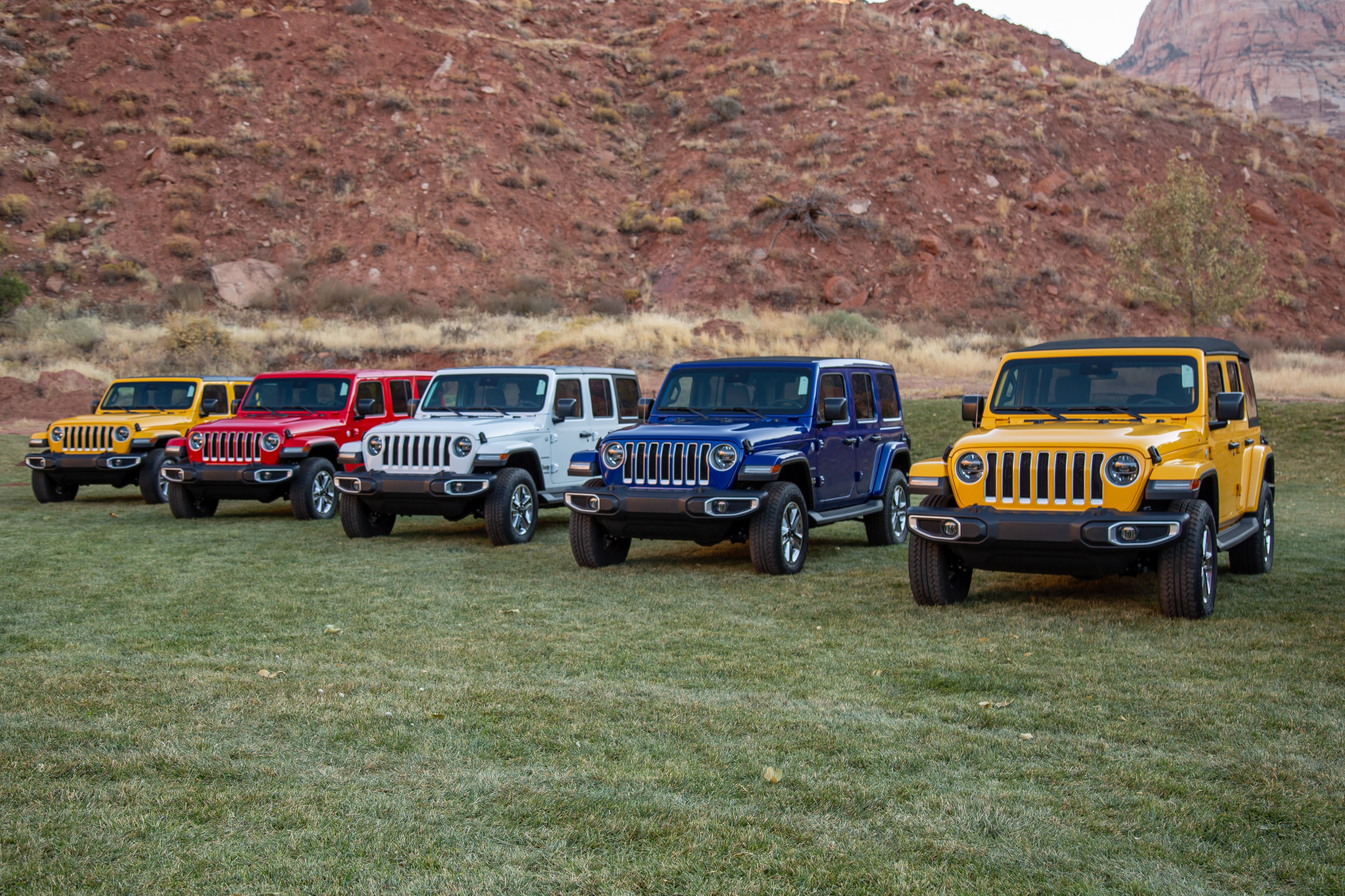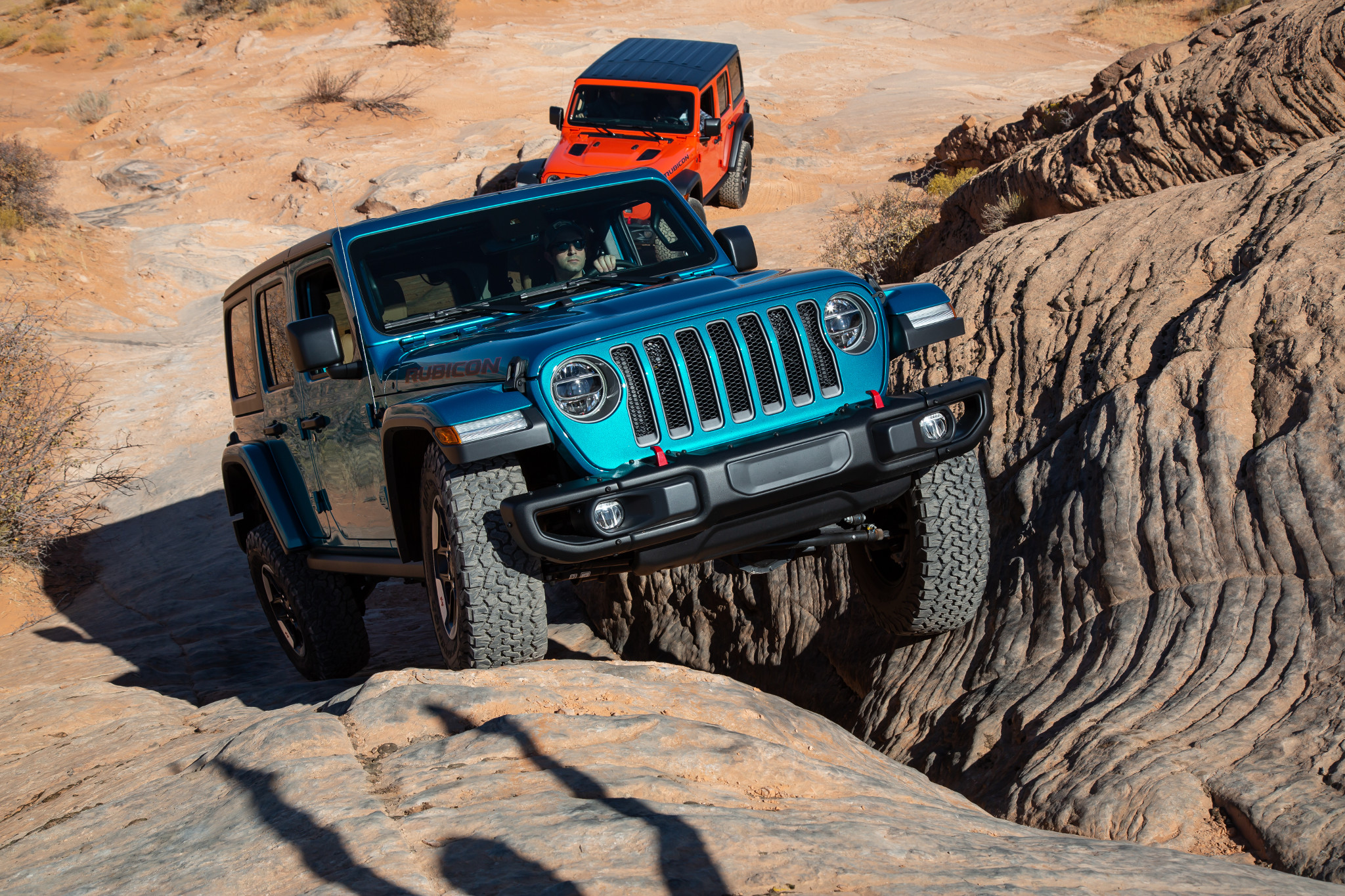For decades, the Jeep Wrangler has been the go-anywhere SUV of choice for outdoorsy adventure seekers (or anyone who wants to look the part). Now comes the EcoDiesel version, which is powered by a torque-rich V-6 that makes this the most fuel-efficient Wrangler ever — at least until the upcoming 4xe plug-in hybrid version arrives.
Related: 2020 Jeep Wrangler EcoDiesel: Efficiency You Can Feel (and Hear)
We recently got behind the wheel of two versions of the 2020 Wrangler EcoDiesel to see if it stands out from the rest of the range. As is, the Wrangler already feels like it’s in a field of one; there’s no other SUV out there that lets you take off the doors, remove the roof and fold down the windshield for a wind-in-your-face (and bugs-in-your-teeth) driving experience. Keep in mind that Jeep recommends folding the windshield only when off-roading at sedate speeds (bugs, dude).
The EcoDiesel is also only available on the four-door Wrangler Unlimited, and it doesn’t come cheap. This engine is better on gas, but it puts a noticeable dent in your SUV shopping budget. Go and read our complete review of the Wrangler EcoDiesel by Cars.com’s Brian Wong by following the related link above. For a rapid-fire rundown of pros and cons, put down those kayaks and camping gear, and continue reading below.
Here are seven things we like — and four we don’t — about the 2020 Jeep Wrangler EcoDiesel:
Things We Like
1. Best. MPG. Ever.
The EPA mileage figures peg the Wrangler EcoDiesel at 22 mpg in city driving and 29 mpg on the highway, for a combined rating of 25 mpg. That won’t rock the worlds of any Prius owner, but it’s much better than the gas-powered Wrangler Unlimited with the standard 3.6-liter V-6 or optional turbocharged 2.0-liter four-cylinder.
2. Tons of Torque
The turbo-diesel 3.0-liter V-6 delivers a strong 260 horsepower, but it’s the 442 pounds-feet of torque that sets this engine apart. The other engines offered in the Wrangler Unlimited don’t come anywhere close to this figure.
3. Smooth Power Delivery On- or Off-Road
All that torque makes the Wrangler EcoDiesel a smooth operator when you step on the gas pedal. Even better, the throttle response is precise enough for off-road driving, too. We worried a mushy accelerator could ruin the Wrangler’s four-wheel-drive aptitude. Thankfully, that isn’t the case — the engine delivers smooth and seamless power working with the standard eight-speed automatic transmission.
4. Off-Road Reign Continues
It wouldn’t be a Wrangler if it couldn’t tackle any obstacle thrown in its way. The Wrangler EcoDiesel has the all-terrain ability of any other model thanks to solid front and rear axles, four-wheel drive and the rock-crawling Rubicon trim. The Rubicon adds underbody skid plates, locking front and rear differentials, all-terrain tires and more.
5. Diesel Available Across All Trims
Jeep doesn’t make you choose fancier and more expensive trims to check the option box for the turbo-diesel engine. The Wrangler Unlimited Sport, the entry-level model, allows you to choose among all three engines, including the new diesel.
6. Room in the Unlimited Is Less Limited
The bad news is that the turbo-diesel isn’t offered on the two-door version of the Wrangler. The good news is that most SUV shoppers need and want the extra room provided by the four-door Unlimited version. Granted, space in the second row isn’t class-leading by any stretch of the imagination, but it’s a lot simpler to get back there versus the climb needed to squeeze into the two-door Wrangler’s tiny rear seat.
7. Smart, Simple Infotainment System
Nothing has changed with the Wrangler’s infotainment system, and that’s a good thing. The Uconnect interface is easy to use and doesn’t complicate things with unnecessary quirks or endless menus. The maximum touchscreen size measures 8.4 inches, and you can add Apple CarPlay and AndroidAuto compatibility (though we do wish that came as standard).
More From Cars.com:
- Find a 2020 Jeep Wrangler for Sale Near You, Now
- Coronavirus Car Deals: 3 Ways Fiat Chrysler Automobiles Is Helping Shoppers ‘Drive Forward’
- 2020 Jeep Wrangler EcoDiesel: Real-World Fuel Economy
- 2020 Jeep Wrangler EcoDiesel Is Officially the Most Fuel-Efficient Wrangler
- Jeep Will Plug Three Coming Plug-Ins, Including a Wrangler, at 2020 CES
Things We Don’t
1. A Pricey Upgrade
You better really want a turbo-diesel in your Wrangler, ’cuz it’s gonna cost ya. As we noted in our review, choosing the EcoDiesel alone adds $4,000 to the price. And let’s not forget this engine means upgrading to an eight-speed automatic that’s tuned to cope with the torque output, too. All in all, a Wrangler Unlimited Sport fitted with the turbo-diesel and automatic means forking over several thousand dollars more than the base price.
2. Weight, There’s More
Adding the turbo-diesel also brings an extra 400 pounds of curb weight compared with either the standard V-6 or optional turbo four. (To its credit, the hefty torque output ensures acceleration doesn’t suffer.)
3. Sahara Buyers, You’re in for a Bumpy Ride
This is a strange one, because it went the opposite of what we expected. During our test drive, it was the more on-road-focused Sahara trim that felt nose-heavy and less confident while cornering. Surprisingly, when we jumped into the Rubicon trim — the one geared more for venturing onto unpaved surfaces — it was the one with the smoother on-road ride.
4. It Gets Very Noisy … We Said It Gets Noisy!
Wait, what did you say? Get used to repeating yourself if you buy the Wrangler EcoDiesel and like to punch the gas pedal. This engine is very loud under hard acceleration. Jeep says extra sound deadening was added to the EcoDiesel, though it sure doesn’t sound like it.
Cars.com’s Editorial department is your source for automotive news and reviews. In line with Cars.com’s long-standing ethics policy, editors and reviewers don’t accept gifts or free trips from automakers. The Editorial department is independent of Cars.com’s advertising, sales and sponsored content departments.
Source: Read Full Article






